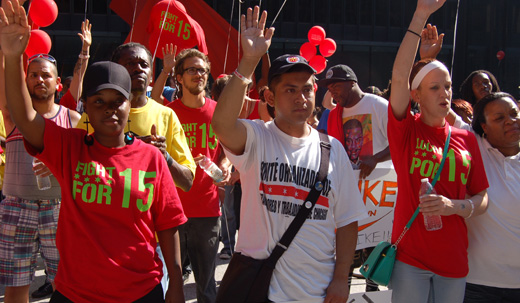
As the AFL-CIO, the 11-million-member-strong national labor federation, wraps-up its national convention in Los Angeles this week, thousands of low-wage fast-food workers across the country are continuing to organize, plan and prepare for the next stage in their ongoing campaign to win $15 an-hour and the right to form or join a union.
The fast-food worker strikes started last November in New York and then spread to Chicago, St. Louis, Detroit, Seattle and other major cities.
As of August 29, fast-food workers in over 60 cities have gone on strike, including in southern states like Texas, Louisiana, Florida, Georgia, and Tennessee.
Undoubtedly, there is an emerging nationwide movement of low-wage fast-food workers who have begun to set the tone regarding the federal minimum wage, fast-food workers’ rights and the future of service sector work generally.
Due to the strikes, even those who don’t support the strikers or their demands have been forced into a national conversation about low-wage workers and the minimum wage.
These workers are striking because they are paid between $7.25 and $8 an hour, without benefits – no sick time, no paid vacation, and very few if any health benefits.
In addition, they have very little control over their hours or working conditions. Their hours are set by managers who play favorites. And most fast-food workers don’t get 40 hours in a week; many get 30 hours or less; and some are called into work for an hour or two and are then told to clock out – even though it cost them more than the minimum wage in gas, bus fare, child care, and related expenses to get there.
I’ve spoken with fast-food workers from across the country. A Detroit striker talked about organizing in the context of that city’s bankruptcy; a Seattle striker talked about making half of minimum wage because she is a tipped employee. A Milwaukee striker talked about working 10 hours straight without a break. A New York striker talked about barely getting 28 hours of work a week. And dignity and respect is a common theme running throughout all of their narratives, as most fast-food workers just want to be treated better. Racism, sexism and favoritism are rampant.
The strikers are largely African American and women and mostly young, which makes this campaign a fight against racism and sexism as well. African Americans and women are usually the strike leaders, too.
Though $15 an hour may seem like a lot compared to the current minimum wage, most economists agree that if the minimum wage had kept pace with inflation it would be around $17 an hour right now. So fast-food workers’ demands are not extreme by any stretch of the imagination, especially for a $240 billion industry. McDonald’s alone makes about $21 billion annually in profits. And the top six fast-food CEOs make a combined $40 million annually, averaging close to $6,000 an hour.
Like the AFL-CIO convention with its dramatic new initiatives, the fast-food strikes are important to the broader movement for social and economic justice for a number of reasons.
First, the strikes and the strikers have helped lend a sense of energy and urgency to the labor movement as a whole. They are a shot in the arm in many places, as a new crop of activists and organizers is emerging and beginning to think not only about their individual struggles at their individual restaurants, but about low-wage workers generally.
Second, as we all know, when we raise the wage floor, especially for those at the bottom of the wage scale, it drives up wages for everybody. Seen in this light, I don’t think it is an exaggeration to say that the strikers are in the forefront of raising everybody’s wages.
Third, the walk-back tactic, which has been very successful in most cases, is significant as community, faith and political leaders are emerging as third-party mediators. Walk-backs generally consist of local community, faith and political leaders literally walking the striking workers back into the restaurants, personally speaking with management and in no uncertain terms informing management that retaliation of any kind will not be tolerated. With the limitations of the National Labor Relations Board, especially for low-wage fast-food workers, this tactic changes the dynamics of power in fast-food restaurants and is radicalizing workers and the very community leaders conducting the walk-backs.
Fourth, the strikers have already won concessions. For example, here in St. Louis I reported on a Wendy’s employee whose paycheck had gotten “lost in the mail.” After community mediation the worker was paid that night with cash out of the store safe – a victory that should resonate among her co-workers and other fast-food workers across the country.
As we all know, sometimes the threat of a union coupled with some bad publicity can win concessions and alleviate some grievances. This seems to be the case in the fast-food workers’ fight for $15 and a union. But they’re not stopping with concessions.
Just as the AFL-CIO is rebuilding a vibrant, diverse, forward-thinking labor movement committed to fighting for the rights of all workers, especially people of color, women and youth, the movement of fast-food workers for $15 and a union is actively working with traditional labor unions and central labor councils, along with community, faith, student and political leaders, to deepen its relationships and expand its reach beyond the McDonald’s or Wendy’s drive-thru
Both know they can’t win alone. Both have a common enemy. And both know they need each other to win real change for working people in this country.
Photo: Fast-food workers rally in Chicago on day of nationwide fast-food worker strikes, Aug. 29, 2013. John Bachtell/PW












Comments